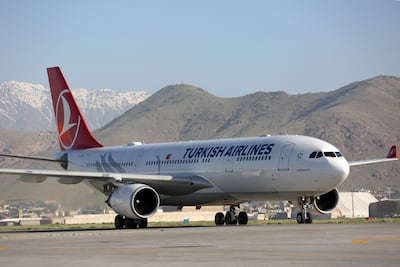The death of a captain during a Turkish Airlines flight this week came as a row rumbles on over the possibility of commercial flights soon having only one pilot on board.
Ilcehin Pehlivan, 59, suffered a heart attack and died on Wednesday several hours into a Seattle-to-Istanbul flight that was forced to divert to New York, where the co-pilot was thought to have landed the plane. According to reports, Mr Pehlivan, who had been with Turkish Airlines since 2007, underwent a medical check-up in March with no serious issues being highlighted.
That a pilot can become incapacitated through illness despite mandatory regular health check-ups shines a spotlight on a key concern about single-pilot operations: who flies the plane if the only pilot on board is unable?
Alan Peaford, editor-in-chief of Arabian Aerospace, said it was increasingly the case that technology would be able to automatically land planes if no pilot was able to do so. "We see some flights in Europe that are single-pilot business aviation and there’ve been no reported incidents," he added.
Public acceptance
Because single-pilot flights are technically feasible "doesn’t mean it’s the best use of technology", said Graham Braithwaite, professor of safety and accident investigation at Cranfield University in the UK.
Before they become a reality in commercial aviation, he said there would be vigorous arguments over safety. "The role of the pilot as part of the crew is significant," he said. "It becomes a very different job, potentially a very lonely job [if there is only one]. It’s more public acceptance and who would want to be that passenger on the first flight with one member of crew when every other flight depended on two."
He doubted he would be keen to fly on a plane with a single pilot any time soon, "because of the huge advantage that comes from having two crew to cross-check each other and troubleshoot".
Emerging forms of flight, such as electric vertical take off and landing (eVTOL) aircraft used for local services, might, he suggested, be better suited to single-pilot flying. Analysts have noted that if aircraft were to be designed for only one pilot, significant redesigns of the flight deck would be required.
Solo flight
The topic of single-pilot flights has been under the microscope for some time. More than 40 countries, including Germany, the UK and New Zealand, asked the UN body that sets aviation standards in late 2022 to help make single-pilot flights a safe reality. The thinking was it would lower costs and ease pressure from crew shortages on passengers flights.
Europe's aviation regulator ruled out an industry push to allow planes to be crewed by one pilot by 2030 but said it was considering allowing limited single-person operations for parts of flights as early as 2027, Reuters reported last year. The news was poorly received by some in the industry with pilots at Amsterdam's Schiphol Airport protesting about the potential safety risks in February.
Cutting relief crew
As well as single-pilot operations (SPO), plane manufacturers, such as Airbus, and regulators are reportedly looking at extended minimum crew operations (EMCO), which may involve only one pilot on the flight deck during quieter parts of a journey.
This could lead to fewer pilots on long-haul flights because requirements for relief crew would be cut.

Aviation Week last year reported Airbus had proposed an A321F aircraft, a narrow-bodied freight plane, that would initially require two pilots but over time could gain approval for use with one. The manufacturer did not respond to a request for comment.
The Air Line Pilots Association has opposed the idea that a single pilot could be present on the flight deck, saying having two is a plane's "strongest safety asset".
"Planes are designed for more than one pilot on the flight deck because safety and operations require it," the organisation said in a statement posted online. "Yet some special-interest groups continue to push for reducing the flight crew on board large aircraft – possibly down to even a single pilot – to cut operational costs."
More advanced equipment

While the thought of having only one pilot on a large plane may seem strange now, attitudes can change over time, as aviation history over the past half-century shows.
The Aerospace Technology Institute, in an online briefing document, reported that "only 50 years ago, it was common for there to be five crew on the flight deck". Engineers and navigators are typically no longer needed. "Now, just two pilots, with much increased levels of assistance from the aircraft, accomplish the same task," the organisation said.
Mr Peaford said significant concerns had been voiced when numbers on the flight deck were cut from five, reflecting the current debate about reducing two to one.
"Now you wouldn’t put five people in the cockpit to find your way to London Heathrow," he said. "I’m happy to fly in an aircraft with no pilot; I’m hoping to be doing that next year. You’ve got to believe in the technology."
There has been much research in recent years into autonomous flight and late last year a Californian company called Reliable Robotics successfully completed a test flight of a small Cessna Caravan plane with no pilot.
However, given that the technology will need to be well-proven before regulations change, Mr Peaford said it was "going to be a good long time" before single-pilot operations were introduced for passenger services of the type most of us take.


